The 'zombie fungus' and the climbing dead
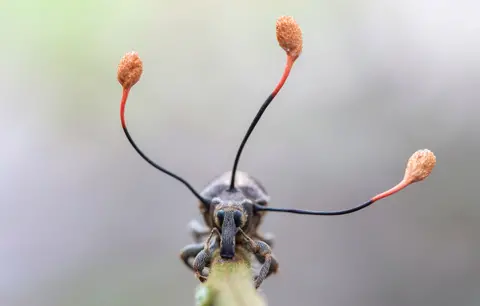 Frank Deschandol/WPY2019
Frank Deschandol/WPY2019
It's just bizarre... and utterly beautiful at the same time.
Those aren't some strange arrangement of antennae on a beetle but the fruiting bodies of a "zombie fungus" that has taken control of the insect.
Its conquest complete, the fungus is about to spread its spores to the wind to find new victims to consume.
This fascinating picture by Frank Deschandol is a Highly Commended image in this year's Wildlife Photographer of the Year (WPY) competition.
The overall winners will be announced by London's Natural History Museum (NHM) next month.
Frenchman Frank's remarkable photo was taken in the Peruvian amazon, near Iquitos, at the Madre Selva biological station.
"At first, I was wondering what could be this weird thing," he said. "Then, I got closer and I was really impressed by this sight and the perfect symmetry of the fungus," he told BBC News.
Frank had seen some other parasitised beetles, but none in quite so photogenic a pose.
Parasitism, where one organism adapts its whole mode of living around the exploitation of another, is one of the great marvels of evolution. And on occasions, it can become wonderfully sophisticated.
In this case, the fungus spreads inside the poor weevil, taking chemical control of the creature and compelling it to climb. When it reaches a suitable height - for the fungus - the insect will lock down on the stem and die. Look and you can see the glaze has gone from its eyes.
Meanwhile, fuelled by the weevil's insides, the fungus will start to grow those exquisite fruiting bodies. The capsules at the top will eventually burst and release countless tiny spores to infect new prey.
"The perfect symmetry made me think to photograph the beetle from the front to get sharp the whole fungus and the head of the beetle both," said Frank.
"Furthermore as the beetle was dead and immobile, I tried a long exposure under daylight, avoiding the sun to reduce the contrast of the background."
Now in its 55th year, WPY has become one of the most prestigious competitions of its kind anywhere in the world. Nearly 50,000 entries were received for this year's event.
Frank Deschandol's picture was Highly Commended in the Plants and Fungi category. A number of other Highly Commended images are shown below.
Reader discretion is advised when scrolling down. Nature can be cruel.
The category and Grand Prize winners will be celebrated at a NHM ceremony on Tuesday 15 October. The museum will then open its annual exhibition of the best photos on the following Friday.

Big cat and dog spat by Peter Haygarth, UK
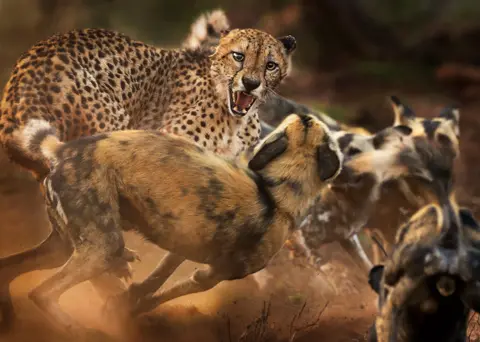 Peter Haygarth/WPY2019
Peter Haygarth/WPY2019
African wild dogs are known to be very effective hunters. Not on this occasion, however. This lone cheetah just managed to escape with its life. The photo was taken in a South African game reserve. Category - Behaviour: Mammals.

Circle of life by Alex Mustard, UK
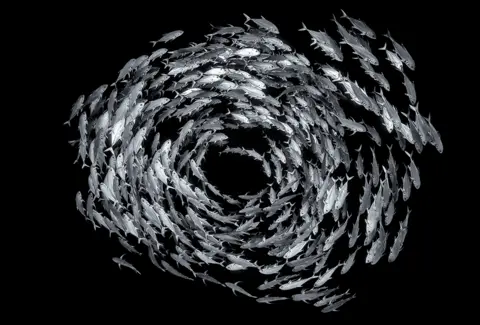 Alexander Mustard/WPY2019
Alexander Mustard/WPY2019
A shoal of bigeye fish in the Red Sea. Their circling behaviour is a dating exercise prior to pairing up, though it also deters predators. Category - Black and White.

Lucky break by Jason Bantle, Canada
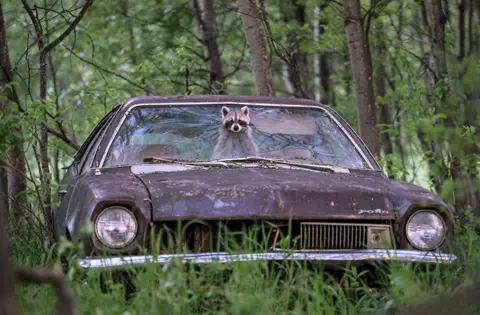 Jason Bantle/WPY2019
Jason Bantle/WPY2019
A raccoon pokes her face out of a 1970s Ford Pinto on a deserted farm in Saskatchewan, Canada. She was using the car as a safe place to bring up her young. The hole was too small for predatory coyotes to pass through. Category - Urban Wildlife.

Touching trust by Thomas Peschak, Germany/S. Africa
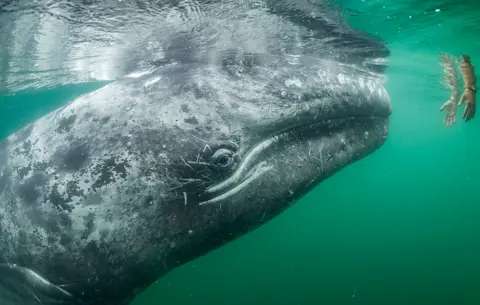 Thomas.P.Peschak/WPY2019
Thomas.P.Peschak/WPY2019
A curious young grey whale approaches a pair of hands reaching down from a tourist boat in San Ignacio Lagoon, Mexico. Mothers and young in the lagoon will actively seek contact with people for a head scratch or back rub. Category - Wildlife Photojournalism.

The hair-net cocoon by Minghui Yuan, China
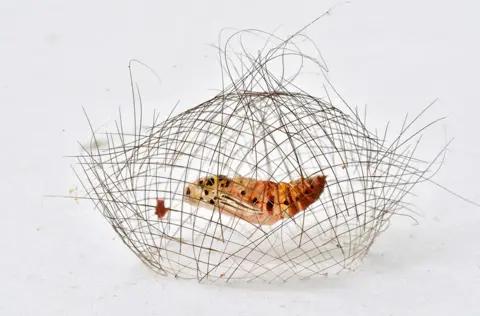 Minghui Yuan/WPY
Minghui Yuan/WPY
This intricate structure is the cocoon cage of a Cyna moth pupa. The caterpillar weaves the den to give it some protection from predators during its grand metamorphosis into an adult moth. Category - Behaviour: Invertebrates.

Beach waste by Thomas Ware, USA
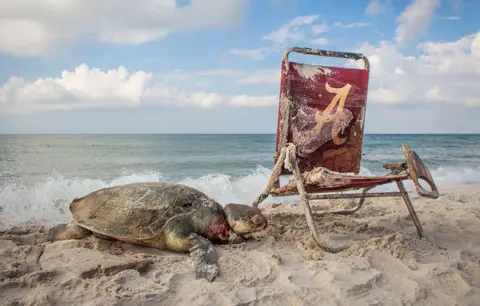 Matthew Ware/WPY2019
Matthew Ware/WPY2019
Littering the oceans has consequences. This Kemp's ridley sea turtle was strangled by discarded fishing gear attached to a washed-up beach chair. The photo was taken in Alabama. Category - Wildlife Photojournalism.

Last gasp by Adrian Hirschi, Switzerland
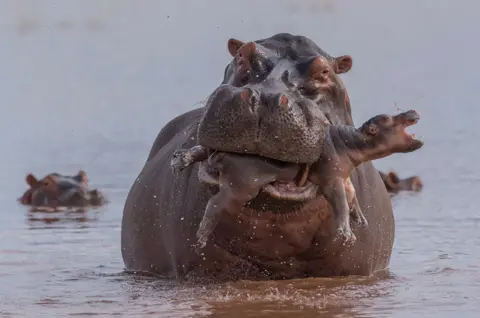 Adrian Hirschi/WPY2019
Adrian Hirschi/WPY2019A newborn hippo is attacked by a bull in the shallows of Lake Kariba, Zimbabwe. This behaviour is rare but may happen if there is competition for space or a male wants to impose his dominance. Category - Behaviour: Mammals.
[email protected] and follow me on Twitter: @BBCAmos
